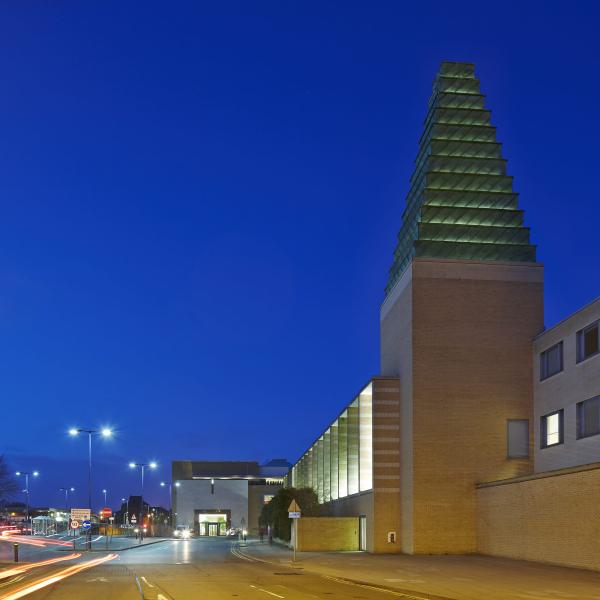H.E. Nana Akufo-Addo, President of the Republic of Ghana, delivered the keynote address at the School for the Oxford Africa Conference 2018.
The theme for the 2018 conference, ‘Enough Rhetoric! Catalysing in an era of concrete action’, sounds simply like a rousing call to action. But as Nana Akufo-Addo explored in his pre-conference keynote speech, it is also a reminder of the complex challenges facing the continent as it struggles to ‘change the Africa story’.
Akufo-Addo’s starting point was an acceptance that this has not so far been ‘truthfully told’ by the international media: ‘I accept that the good news about Africa travels somewhat slower than the bad news … I accept that we have to overwhelm with widespread and consistent success to be able to make an impression.’ There have been many ‘false dawns’, and the rest of the world still struggles to comprehend that Africa is not a single country but instead a continent of 54 sovereign nations – except when one appears to outstrip the others, such as Nigeria in the 1970s and early 1980s, or indeed Ghana itself.
Africa is a continent rich in natural resources, and yet, as Akufo-Addo said, ‘you would not know that we have these natural endowments: we look poor, we feel poor and we have huge infrastructural deficits.’ From a Ghanaian point of view, he felt this was because, despite 60 years of independence, the country was ‘stuck’ with the economy of a colony, that is, ‘the production and export of raw materials which puts us in the mercy of wildly fluctuating commodity prices over which we have no control, and the import of manufactured commodities from the industries of colonial power which creates wealth and jobs there but not at home.’ The problems, he admitted, had been exacerbated by mismanagement and corruption, and by dependence on foreign aid, which he described as ‘a debilitating factor in our efforts to develop our country; it saps our self confidence and undermines the dignity and respect that will propel us to prosperity.’
He was quick to stress that this was not because he was ‘poor and proud’, but because he wanted Ghana, and the rest of Africa, to ‘set our minds to a deliberate qualitative change in all aspects of our lives, especially in the structure of our economy, the nature of our infrastructure, the education of our young people and the acquisition of skills.’
The ‘one district, one factory’ initiative has been designed to facilitate the rapid industrialisation of the country and provide jobs for unemployed young people. This will go hand in hand with the establishment of integrated development authorities to manage the development of natural resources across the country, and a programme of agricultural transformation. ‘The spectacle of a nation with vast tracts of arable land [and] plenty of water … importing billions of dollars worth of food stuffs every year because of inappropriate policy choices is completely unacceptable,’ he said.
Afuko-Addo detailed the other plans that were in place to support Ghana’s industrial and agricultural transformation, including improvements to the power sector (starting with reducing debt and encouraging more investors) that will lower costs to businesses, and investment in education and skills. ‘We are investing in our future scientists and engineers, model farmers, innovators and entrepreneurs and transformation agents. We are shifting the emphasis on education and showing the science, technology, engineering and mathematics drive all sectors of the economy, for committing resources to basic and applied science and engineering to show that we are able to move the critical lead for technicians and engineers.’
To the somewhat rueful laughter of many Britons in the audience, he described the benefits of the agreement to establish a continential free-tade area and increase the amount of intra-continential trade. ‘This market will provide immense opportunities to provide wealth and prosperity to the African people with hard work, ingenuity, innovation and enterprise. It will mean a rapid increase in exchange of our agricultural, financial, industrial, scientific and technological products, which will then enhance dramatically our prosperity and the prospects of employment to the broad masses of Africans. Our economies would then be shaped not by the production in export of raw materials but by the things we make.’
He acknowledged that none of this was necessarily going to be easy, and that not all African countries were at the stage of economic development where they could contribute to a free trade area, but he said that ‘really, if we don’t start getting our act together it is not going to work for us and I think that is important, and if we look at it on a continental basis it is difficult for people now to stick to these regional or national considerations.’ He did not expect everyone to sign up at once, pointing out that the EU started life as an agreement between only two countries, but was confident that there were champions in every country who would see the benefits and push for change.
He acknowledged too that the idea of restructuring African economies and moving away from a reliance on aid was hardly new. People had talked about it as far back as 1971, but nothing much had happened. That, he thought, was because many of the enabling conditions were not in place: speedy industrialisation needed a stable currency, good economic management, and a range of incentives to encourage business development, investment, and the development of education and skills.
He concluded: ‘Ghana, and indeed Africa, beyond aid is meant to be more than a slogan. It is meant to propel us into the frame of mind that will quicken our pace of development, and it is meant to change our mindset from one of dependency and living on handouts to one of achieving our destiny. It is meant to put us in charge of our own affairs, and make us truly independent. Above all the Ghana beyond aid will give us the respect and dignity we deserve.’
